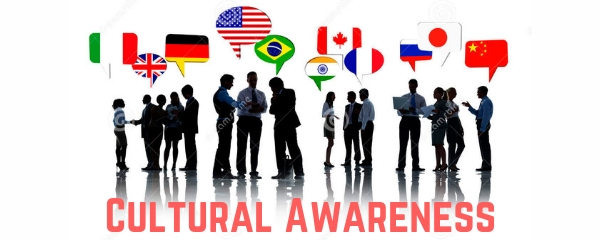Imagine yourself walking into a bustling marketplace in a foreign country. The sights, sounds, and smells are overwhelming, but there’s a feeling of excitement, a sense of adventure. As you navigate the packed stalls, you notice a curious custom: people are bargaining fiercely over prices, but with smiles and laughter. What are you witnessing? Cultural differences in communication styles. This seemingly simple interaction reveals the importance of cultural awareness – understanding how cultural context shapes behaviour and communication.

Image: www.pelajaran.guru
Cultural awareness is more than just knowing the names of different countries or holidays. It’s about developing a deep understanding and appreciation for the diverse ways people think, behave, and communicate. It’s about recognizing that the world is a mosaic of cultures, each with its own unique history, values, beliefs, and perspectives. This awareness helps us navigate the complexities of an increasingly interconnected world, fostering empathy, tolerance, and effective communication across cultures.
The Power of Understanding: Why Cultural Awareness Matters
Cultural awareness is like a compass, guiding us towards a more nuanced and informed understanding of ourselves and the world around us. It allows us to:
1. Build Stronger Relationships
When we are culturally aware, we are more likely to be sensitive to the nuances of communication, customs, and values of others. This sensitivity fosters empathy and trust, building stronger and more meaningful relationships, whether in personal or professional settings.
Imagine a business negotiation between a team from a Western culture and a team from a collectivist culture. A Western team might focus on individual achievements and direct communication, while a collectivist team might prioritize group harmony and indirect forms of communication. Cultural awareness helps bridge these differences, leading to more effective collaboration and successful outcomes.
2. Communicate More Effectively
Cultural awareness enhances communication by helping us understand the subtle cues and contexts that influence how people convey messages. It allows us to decipher nonverbal signals, interpret the meaning behind words, and avoid misinterpretations that can lead to misunderstandings and conflict.
For example, in some cultures, maintaining eye contact during a conversation is considered polite, while in others, it can be seen as disrespectful. Understanding these cultural norms helps us communicate effectively, build rapport, and avoid causing offense.

Image: keplarllp.com
3. Foster Empathy and Tolerance
Cultural awareness encourages us to step outside our own perspectives and see the world through the eyes of others. It helps us appreciate the unique experiences, challenges, and perspectives of diverse cultures. This understanding fosters empathy, tolerance, and a willingness to learn from each other, creating a more inclusive and welcoming world.
4. Promote Global Collaboration
In today’s interconnected world, collaboration across cultures is essential for solving global challenges like climate change, poverty, and disease. Cultural awareness enables us to bridge cultural differences, build trust, and work together effectively towards common goals.
Take the field of medicine, for instance. Understanding the cultural beliefs and practices of patients can lead to better treatment outcomes. For example, a patient from a culture that emphasizes holistic healing might require a different approach than a patient from a culture that focuses on Western medicine.
5. Enhance Personal Growth and Development
Cultural awareness is a journey of perpetual learning, a valuable personal skill that expands our worldview and promotes intellectual curiosity. It challenges us to question our assumptions, embrace new perspectives, and appreciate the richness and diversity of human cultures.
Developing Cultural Awareness: Cultivating a Global Mindset
Developing cultural awareness is a lifelong process that requires conscious effort and a commitment to continuous learning. Here are some practical steps you can take:
1. Embrace Travel and Immersive Experiences
Traveling to different countries is one of the most powerful ways to gain firsthand experience of diverse cultures. Immerse yourself in local customs, traditions, and conversations. Engage with people from different backgrounds, listen to their stories, and ask questions with genuine curiosity.
2. Engage with Diverse Media and Literature
Explore books, films, music, and art from various cultures. By immersing yourself in these artistic expressions, you can gain deeper insights into the values, beliefs, and experiences of different communities around the world.
3. Cultivate Cross-Cultural Connections
Make an effort to build relationships with people from different cultural backgrounds. This could involve joining cultural groups, participating in community events, or simply engaging in conversations with colleagues and friends from diverse cultures.
4. Develop Cultural Sensitivity
Be mindful of your own cultural biases and assumptions. Recognize that your perspective is just one of many, and be open to understanding the world from different vantage points. Practice active listening and ask clarifying questions to ensure you are understanding the intended message.
5. Learn about the History and Context of Different Cultures
Understanding the historical context behind cultural practices and beliefs can provide valuable insights into the evolution of different societies. Learn about different religions, political systems, and societal structures to gain a deeper understanding of cultural differences.
6. Explore Language Learning
Learning a new language can be a transformative experience. It enables you to connect with people on a deeper level, navigate diverse cultures with greater ease, and gain valuable insights into how different languages shape thought and communication.
Why Is Cultural Awareness Important
https://youtube.com/watch?v=4vtC8qJXyL0
Cultural Awareness: A Foundation for a Better World
In a world increasingly defined by globalization and interconnectedness, cultural awareness is not merely a desirable skill; it’s a necessity. It equips us to navigate the complexities of cultural differences with empathy, respect, and understanding. By embracing cultural awareness, we foster stronger relationships, promote effective communication, and contribute to a more tolerant, inclusive, and globally minded society.
This journey of understanding begins within each of us. By actively seeking out diverse voices, challenging our own assumptions, and building meaningful connections with people from different cultures, we can collectively create a world where differences are celebrated, bridges are built, and understanding leads to progress.






